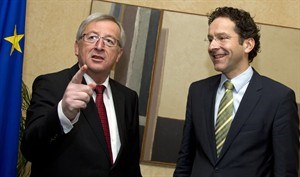
Luxembourg's Prime Minister and head of the eurogroup Jean-Claude Juncker, left, speaks with Dutch Finance Minister Jeroen Dijsselbloem during a media opportunity at the prime ministers office in Luxembourg on Friday, Jan. 18, 2013. The outgoing leader of the group of finance ministers from the 17 European Union countries that use the euro is meeting with Jeroen Dijsselbloem on Friday, another indication the Dutch finance minister will take the post next week. (AP Photo/Virginia Mayo)
January 21, 2013 - 7:53 AM
BRUSSELS - The Dutch finance minister was poised on Monday to take over as head of the Eurogroup, the gatherings of the 17 eurozone finance ministers, which would give him one of the top jobs in the currency bloc's battle to end its financial crisis.
Jeroen Dijsselbloem, 46, appeared to have wide backing ahead of a finance ministers' meeting in Brussels, where the appointment was due to be announced.
Dijsselbloem (DIE-sell-bloom) served in Dutch parliament as a member of the centre-left Labor party for most of the past decade and only became finance minister in November. His candidacy came as a surprise because of his relative lack of experience, but he emerged as the compromise candidate between Europe's main political groups and between the economically stronger and weaker nations.
Outgoing Eurogroup President Jean-Claude Juncker, who's also prime minister of Luxembourg, has over the past three years been at the heart of Europe's efforts to avoid a breakup of the euro, a currency used by 330 million people. He weathered all-night meetings and wee-hour press conferences with global markets hanging on his every word.
Heading into the finance ministers' meeting on Monday, Juncker, who has held the post for eight years, said he was relieved to step down.
He also dashed hopes for a quick solution to the eurozone's latest problem, the cash-strapped Mediterranean island nation of Cyprus, which is seeking a bailout from its European partners.
"I believe we won't be able to make a decision today. ... That will probably happen in March," Juncker said. Cyprus will be discussed but the negotiations are ongoing, he added.
Cyprus is seeking rescue loans for about €17 billion ($22.6 billion) — almost equivalent to its annual gross domestic product. About €10 billion of that would go to shore up the country's ailing banks, with the remainder to keep the government afloat.
The bailout could push Cyprus' debt load up to 150 per cent of GDP, a level economists consider unsustainable for such a small economy.
In creditor nations such as Germany, Europe's biggest economy, the bailout has been met with skepticism amid allegations that Cypriot banks helped launder Russian money and facilitated tax evasion.
German Finance Minister Wolfgang Schaeuble told daily Sueddeutsche Zeitung in an interview published Monday that it was still unclear whether Cyprus would be bailed out at all, because it wasn't clear if a Cypriot bankruptcy "would endanger the eurozone as a whole at all."
If Europe and the International Monetary Fund balk at bailing out Cyprus, which accounts for only 0.19 per cent of the eurozone's economy, the country could face bankruptcy within months, possibly forcing it to leave the eurozone.
Cyprus has been shut out of financial markets for over a year and currently gets by on rescue loans from state-owned companies. The government says it won't be able to pay its bills beyond March.
News from © The Associated Press, 2013